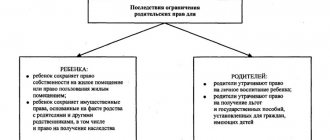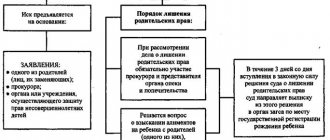- Does the state pay alimony for the debtor? Law on alimony from the state
- Creation of an alimony fund
- Conditions of receipt
- Conditions and stages of receipt
Many Russian mothers (since most often in single-parent families minor children stay with their mother) are concerned about the question: if the father does not pay child support, can the state pay for him, and where should he go for this? In this regard, State Duma deputies, government officials and representatives of the public have repeatedly spoken out about the need to create a special alimony fund , with the help of which material support would be provided to children who do not receive payments from irresponsible parents.
Unfortunately, there is still no . However, in some regions of Russia, needy low-income mothers and fathers who do not receive alimony for minor children can apply to social protection authorities for an increased monthly child benefit .
In addition, the state is expanding the list of punitive measures against debtors to encourage them to repay their debts. If the enforcement search for the debtor does not bring success for a long period of time, in 2021 the mother (father) of the child is given the right to apply to the Pension Fund of Russia (PFR) to receive financial assistance.
Photo pixabay.com
Does the state pay alimony for the debtor?
On April 3, 2021, a group of State Duma deputies from the LDPR faction proposed an amendment to the Family Code regarding state support for citizens entitled to alimony (bill No. 680786-7). Government officials are discussing the possibility of obliging the state to pay alimony to children and other needy categories of persons, starting from the 6th month of absence of payments by the person obligated for alimony.
This bill was rejected after consideration in the first reading of the State Duma. Later, other similar initiatives arose, but all of them were never adopted.
However, there is every reason to believe that alimony from the state will appear in Russia in the near future. On October 24, 2021, Vladimir Putin approved a list of instructions following an extended meeting of the Presidium of the State Council. In accordance with this document, the Government was instructed to submit proposals by August 1, 2021 to provide targeted social support to children whose parents do not pay child support. The prime minister of the Russian Federation, Mikhail Mishustin, is responsible for the implementation of this order.
The article will be updated as new information becomes available.
According to the current legislation, child support can be awarded both in shares and in a fixed sum of money (TDS):
- in a voluntary way, which involves concluding a notarial agreement;
- forcibly - through the court, if it was not possible to resolve the dispute on your own.
If the child’s mother or father leaves abroad for permanent residence, and no agreement on the payment of alimony has been reached between the parents, the interested person has the right to determine the amount of the TDS in court. The law also gives the right to provide certain property of the payer as alimony .
However, the assignment of alimony payments does not guarantee the receipt of funds into the child’s account. Vice-Rector of the Academy of Labor and Social Relations Alexander Safonov emphasizes that evasion of alimony payments is a widespread practice. Most often, fathers refuse to provide for their children and do not take part in their upbringing. According to statistics, in approximately 50 percent of cases, bailiffs cannot find debtors or collect alimony from them.
Law on payment of alimony by the state
Back in 2014, State Duma deputies O. A. Nilov, O. L. Mikheev and S. M. Mironov came up with Bill No. 489583-6, the purpose of which was to expand guarantees for children to receive alimony payments. In particular, it was said that the amount of funds collected per child should not be lower than the subsistence level in the region of residence . An exception could be difficult life situations of the alimony payer:
- disability;
- establishing the fact of serious illness;
- the need to care for a sick or incapacitated family member, etc.
In addition, deputies considered the possibility of creating a state alimony fund , from which payments would be made to needy citizens if they did not receive alimony. Unfortunately, the bill was rejected by the State Duma on July 5, 2017 and has no legal force .
There are debates in society about the advisability of making compensatory alimony payments by the state for the debtor. On the one hand, the project corresponds to state policy and will be aimed at protecting the interests of motherhood and childhood - one of the most socially vulnerable groups. However, shifting the responsibility of able-bodied family members to the state can have a number of negative consequences.
Alimony fund
The idea of creating an alimony payment fund in Russia has been discussed by government officials for a long time. It was assumed that the purpose of this structure would be to change the mechanism for paying alimony . At the moment, the claimant cannot receive funds until they are paid by the debtor.
If an alimony fund is created, then if there is a debt, funds for the child (or other disabled dependent) of the defaulter will be allocated from it. Thus, the alimony holder will no longer owe money to the collector , but to the state, which has more powerful leverage over debtors.
If the bill had been adopted, most likely, the state would have stopped compensating for child support in the same cases as when it was paid by the person obligated to pay it. These factors are regulated by Part 2 of Art. 120 of the Family Code of the Russian Federation:
- in the event of the death of one of the parties (payer or recipient of financial assistance);
- the son or daughter of the payer reaches the age of majority or the child acquires full legal capacity;
- upon the fact of adoption of a child for whom alimony was paid;
- expiration of the terms of the notarial agreement or the occurrence of circumstances that are the reason for its termination.
The adoption of a law on the creation of an alimony fund would allow women and men who do not receive alimony from their second parent for a long period of time to count on receiving compensation from the treasury. So far, no corresponding amendments have been made to the Family Code, and in 2021 there is no alimony from the state .
Arbitrage practice
A significant amount of judicial practice in cases of claiming alimony consists of cases of collecting alimony for a minor child in a fixed amount, as well as for a pregnant ex-wife. One of these cases was considered at court site No. 2 of the Central Judicial District of Novosibirsk in February 2021.
The essence of the plaintiff's demands was that:
- Her minor child received a monthly allowance of 10,000 rubles. from father from 01/01/2016
- Her husband paid her alimony in an amount equal to one subsistence minimum for an able-bodied adult in the Novosibirsk region.
The defendant stated that he agreed to pay the child half of the child’s subsistence minimum in the Novosibirsk region. For the rest, he asked the judge to refuse the plaintiff.
During the trial, the judge found:
- The plaintiff has a calculation of expenses for the child from April 2021 to January 2021, from which it follows that the amount of 10,000 rubles. will help maintain the child’s existing level of support.
- Doctors diagnosed the child with a skin disease that requires long-term and systematic treatment. The plaintiff indicated that the cost of monthly treatment is included in the amount of 10,000 rubles.
- The defendant does not work at the time of the proceedings; he owns a car, as well as land and a house in the Novosibirsk region.
- Alimony cannot be recovered from 01/01/2016, since the plaintiff, before applying for judicial protection, did not take measures to request alimony from her husband. In this regard, alimony will be collected only from the day the statement of claim is submitted to the magistrate.
- The judge decided to award alimony in favor of the child in the amount of 0.8 of the child's subsistence level in the Novosibirsk region. The judge reasoned that this amount is not overly burdensome for the father and does not infringe on the interests of the minor.
- The court agreed with the plaintiff’s request to provide her with monetary support from her husband in an amount equal to one subsistence minimum for an able-bodied adult in the Novosibirsk region, since their common child had not reached the age of three.
In the following case, the plaintiff was a disabled parent who made child support claims for his adult children. This case was heard at the 139th judicial district of the Solntsevsky judicial district of Moscow in March 2021.
The father demanded in court from his three children that they provide him with help in treating the consequences of several strokes. The plaintiff is a disabled person due to receiving group 3 disability and reaching retirement age. He justified his need by saying that his pension was not enough for treatment. In this regard, he stated that each child should pay him 10,000 rubles. monthly.
The defendants, in turn, said that they would not support their father because he did not help them financially in childhood and did not take any part in their lives.
During the trial, the judge found:
- The plaintiff is indeed the father of the defendants, is truly disabled, has suffered several strokes and needs treatment. These facts are confirmed by documents from the state registry office and medical documents.
- The defendants' incomes exceed the established minimum subsistence level in Moscow, therefore, they have the necessary funds.
- The court did not find any evidence convincingly indicating that the plaintiff evaded the fulfillment of child support obligations when the defendants were minor children.
- The right to alimony for a disabled parent is unconditional, so the court decided to recover from each defendant an amount equal to 1/3 of the subsistence minimum for pensioners in Moscow.
What does the state do if a parent does not pay child support?
Guardians with whom minor children live do not have the right to receive alimony from the state if the debtor fails to pay it. However, the authorities have developed a number of effective measures by which the Federal Bailiff Service (FSSP) influences defaulters and forces them to repay the debt .
However, if certain conditions are met, citizens can count on material compensation from the state in the event of non-receipt of alimony. In particular, the right to receive increased child benefits , taking into account the criteria of his need. This method is suitable for low-income citizens with children under age.
Conditions for receiving benefits
The amount of preferential payments, the timing and frequency of their appointment are established and regulated by each subject of the country individually (Article 16 of Federal Law No. 81-FZ of May 19, 1995). However, there are general principles according to which benefits can be increased:
- The recipient of alimony must be recognized as low-income, that is, the average monthly income for each family member must not exceed the subsistence level.
- The claimant has a writ of execution or a court decision in his hands.
- The alimony holder is hiding and (or) not fulfilling his financial obligations.
- Accumulation of unpaid debt (on average, about 6 months).
Monthly payments may also be slightly increased in cases where the child’s parent :
- is undergoing military service;
- does not pay child support for the following reasons:
- evades payment of alimony;
- undergoes compulsory treatment;
- is wanted.
serving a prison sentence;
The duration of payments is established by the authorities of the constituent entities of the Russian Federation . For example, in the Bryansk region, funds are paid until the age of 16, and if the child continues to study in a general education organization, then until the age of 18.
The amount of benefits also varies and can range from several hundred to several thousand rubles . To clarify official information about the amount and duration of payments, you must contact the social protection authorities . In some regions there may be no surcharge.
How to get benefits for non-payment of alimony
To receive “children’s” benefits, the legal representative of a child whose parent does not pay child support must contact the social security authorities at the address of residence and provide the organization’s employees with a package of the following documents:
- Application for child benefit.
- Child's birth certificate.
- A certificate confirming that the child lives together with the parent who wishes to receive the benefit.
- Certificate of salary for each family member - to confirm low income and need.
Depending on the circumstances, the following evidence is required that payment of alimony is not carried out or is impossible :
- information from the bailiff service that the location of the debtor was not established at the time of applying for increased benefits;
- a certificate of the location of the debtor: from the place of deprivation of liberty, from a medical organization, as well as a document confirming that the alimony holder does not have earnings sufficient to fulfill the court decision;
- information from the military commissariat about the conscription of the child's father for military service.
The list of required documents can be expanded: for example, sometimes a divorce certificate is required. Up-to-date information should be obtained from the social security authorities in the locality of residence.
In this case, the recipient of assistance will need to periodically confirm their low-income status so as not to lose benefits. If the relative starts paying child support again, payments from the state will also stop.
Features of alimony collection
In all cases, the relationship between the alimony provider and the alimony recipient regarding the collection of alimony can be resolved by concluding an alimony agreement with a notary. This is a convenient and flexible way to independently regulate alimony obligations, in particular, establish the frequency of payments, the duration of the contract and the amount of payments.
Below we will describe the features of judicial collection of alimony payments for various categories of alimony recipients.
For minor children
Minor children are the only category of dependents for whom 2 principles are applied for calculating the amount of monthly child support. The application of these principles depends on the presence or absence of “white” earnings.
| Type of earnings | Calculation principle |
| "White" | It's called a percentage of income. An additional criterion is the number of young children the child support payer has. As the law indicates, the alimony pays:
|
| Absent; in foreign currency; irregular; actually; periodically changing | It's called a fixed amount. Alimony is calculated either from the amount of the child's subsistence level established in the region of residence of the minor, or on the basis of documented expenses for it. In addition, when assigning alimony, the judge is obliged to take into account the presence of other dependents supported by the alimony payer, as well as his level of income. If, during a divorce, children remain with each parent, then alimony can only be awarded in a fixed amount. The key criterion when establishing the amount of alimony benefits is the material security (salary, business income, property) of each parent. In other words, child support is paid by the more affluent parent in favor of the less affluent parent. |
For a mother with a child under 3 years old
Here are the following features of recovery:
- The mother can be either the legal wife or the ex-wife of the alimony payer.
- Alimony can only be calculated in a fixed amount and must be paid monthly.
- The right to alimony is undeniable, i.e. the husband or ex-husband cannot be released from this obligation due to the unworthy behavior of the spouse or ex-wife or the short duration of the marital relationship.
- The spouse is obliged to have at his disposal the necessary means, i.e. earn more than 1 subsistence minimum per adult.
For disabled spouses
Russian legislation understands the following as disability:
- Reaching retirement age.
- Disability of any group. It must be confirmed by the conclusion of a medical commission.
The right to demand alimony from disabled spouses is strictly limited by time frame, namely the period of marriage or 1 year after divorce. In addition, if a person wishing to receive alimony is observed to have the actions described below, and the potential alimony provider proves their validity, the judge has the right to either limit the period of alimony payments or completely release the defendant from the burden of alimony obligations:
- A person wishing to receive alimony has become disabled as a result of committing an intentional crime or due to excessive use of alcohol or drugs.
- The person wishing to receive alimony behaved unworthily in the marital relationship, for example, he was aggressive, insulted other family members, did not want to work or study, frivolously spent money on gambling or his own fleeting hobbies.
- The marriage between the spouses was short-lived, i.e. less than 1 year.
For children over 18 years old
The obligation to pay child support in this case rests with the parents and is unconditional. Children must be:
- Disabled (retired or disabled).
- Those in need of help, for example, money to buy medicines, pay for the services of doctors or caregivers.
Payments are made only in a fixed amount and monthly.
Compensation for child support from the state if the parent is wanted
If the executive search for the alimony debtor does not bring results within 1 year , the recipient of financial assistance has the right to go to court to recognize the payer as missing. If the judge makes a positive decision in the case, the child whose missing parent will be entitled to receive a survivor's pension instead of child support.
On March 7, 2021, Vladimir Putin signed Federal Law No. 48-FZ, amending Art. 278 of the Civil Procedure Code (Civil Procedure Code) of the Russian Federation. Thanks to these amendments, when considering a case on declaring a citizen missing, judges have the right to request information about the wanted alimony worker directly from the bailiff conducting the proceedings in the case.
Previously, only internal affairs bodies, which were not involved in providing information about alimony debtors, could confirm information about the impossibility of finding absent citizens. This created a hopeless situation that prevented people from receiving a pension instead of alimony.
Children whose fathers (or mothers) are missing are equated to citizens who have lost their breadwinner , according to Part 1 of Art. 10 of Federal Law No. 400-FZ of December 28, 2013. Consequently, they have the right to material support from the state in the form of an appropriate pension. It is paid until the age of 18 or 23 , if the child is studying full-time (full-time).
Thus, responsibility for the financial support of a child, one of whose parents is missing, does not fall solely on the shoulders of his mother, father or other guardian.
How to get a pension instead of alimony in 2021
After 1 year of unsuccessful search for the alimony holder, the bailiff is obliged to:
- Call the recipient of funds for an appointment.
- Explain to him the procedure for filing a claim with the district court to declare the debtor missing.
If, for some reason, the bailiff does not call the collector after a year of fruitless searches for the debtor, the recipient can independently visit the official and demand clarification from him about the procedure for declaring the alimony provider missing .
List of documents submitted to the court to recognize a citizen as missing:
- Statement of claim.
- Plaintiff's passport.
- A copy of the court order or court decision on alimony.
- A copy of the resolution on the amount of alimony debt - as confirmation of unfulfilled alimony obligations.
- A copy of the resolution on placing the debtor on the executive wanted list.
If the claims of the alimony recipient are satisfied, the court’s decision to recognize the defaulter as missing will become the main basis for assigning a pension instead of alimony . The legal representative of the child will need to contact the regional division of the Pension Fund of the Russian Federation and clarify with government agency employees the further procedure for obtaining the required pension.
Recognition of the alimony provider as missing entails serious sanctions for him. If a negligent parent is found, he will subsequently be obliged not only to repay the debt to the state represented by the Pension Fund of Russia, but also to continue to pay child support for the minor child.
List of documents for filing a claim for alimony collection
The collection of alimony at the first instance is carried out exclusively by magistrate judges. The choice of judge is the prerogative of the plaintiff, i.e. he can file a claim at his own place of residence or at the place of residence of the other party to the process (the defendant).
Along with the statement of claim, samples of which can be downloaded from here (alimony as a percentage of income) or from here (alimony in a fixed amount), the plaintiff must submit additional documents to the court. The number of their copies depends on the number of participants in the process. The list of documents includes:
- Certificate of family composition. It is necessary if the child support recipient is a minor child.
- Marriage certificate or divorce certificate.
- Information about the defendant's income.
- Conclusion of a medical commission on disability (for disabled spouses or disabled former spouses).
- Birth certificate of the minor to prove his age and the child's relationship with the defendant.
- Pension certificate (for disabled pensioners).
- Medical certificate of pregnancy.
- Calculation of the amount of alimony required by the plaintiff.
- Evidence of need (for needy ex-spouses, needy adult children), for example, a 2-NDFL certificate indicating income below the subsistence level or the presence of a disease requiring expensive treatment.
Documents are submitted to the magistrate in person or by mail. After receiving the documents, the judge examines the received materials within 5 days. As a rule, the study ends with the acceptance of the application for production.
Cases regarding claims for alimony are resolved in most cases within 1 month. It is advisable to prepare thoroughly before filing a claim, clearly formulate your requirements, and collect all the necessary documents and evidence. This will make it easier for the plaintiff to substantiate his claims and reduce the judge’s doubts about the legality of the plaintiff’s claims.
The magistrate concludes the proceedings by issuing a decision. By law, it does not come into force on the day it is issued. This is done so that a party to the process who is dissatisfied with the decision can appeal it to a higher court. 1 month is allocated for appeal from the date of its production in final form. In the absence of complaints from the parties, the decision receives legal force and is transferred to the bailiffs for execution.
Debtor's liability for non-payment of alimony
Family, executive and administrative legislation defines a wide range of effective measures to influence debtors. The application of penalties should encourage alimony payers to repay the debt. The methods used by bailiffs include:
- Fine:
- Articles 17.14 and 35.1 of the Code of Administrative Offenses (CAO) of the Russian Federation provide for fines from 1,000 to 20,000 rubles;
- according to Part 2 of Art. 115 of the RF IC, the recipient of alimony payments has the right to recover from the debtor a penalty in the amount of 0.1% of the debt amount for each day of delay.
- If you have a debt of 10,000 rubles. It is possible to suspend a special right – the debtor’s driver’s license .
- Ban on travel outside the Russian Federation.
- Seizure of funds and property of the defaulter, and also provides for the possibility of foreclosure on the property of the defaulter. This means that the debtor’s property and money located in banks can be withheld and allocated to pay alimony debt .
- Putting the defaulter on the wanted list.
- Deprivation of alimony parental rights.
- Involvement in compulsory work for up to 150 hours.
- Administrative arrest – from 10 to 15 days.
- If there is a deliberate malicious failure to pay alimony, alimony may be applied to a citizen criminal liability measures:
- correctional or forced labor;
- arrest up to 3 months;
- imprisonment for up to 1 year.
Criminal liability (maximum sanction) occurs if administrative methods have already been applied to the alimony defaulter, and they did not bring results .
In accordance with the law, sanctions will be applied to the alimony provider only if the debt arose through his fault. Otherwise, the citizen may be exempt from paying the debt .
Evidence after the fact
In order to demand payment of the debt, the parent will have to prove the fact of payment of child support. Especially if until this moment the father did not worry about executive documents.
The following documents will help confirm payment:
- Receipts for money transfers. They must indicate the details of the sender and recipient of the money, and indicate the purpose of the payment (for example, “Alimony for Matvey for May”).
- Bank account statement. If there is a debit from your account, a specific purpose must be indicated.
- Receipt for transfer/receipt of cash. It must be written by hand by the child’s mother, noting the date and place, full name, date of birth and passport details of the payer and recipient of the money, the amount in numbers and words. The document must state what the funds are used for.
- Certificate from the place of work. It is issued by the accounting department if money for child support is regularly withheld from the child support payer’s salary.
Additional evidence of payment of alimony will be the testimony of witnesses. The support of relatives and friends may come in handy if they can verbally confirm that you communicated with the child, gave him gifts, and paid child support.
Video and audio recordings are also an argument, albeit a secondary one. This could be a correspondence in the messenger, a recording of a telephone conversation, a voice recorder of a conversation about the payment of alimony, or a videotaped transfer of money.











